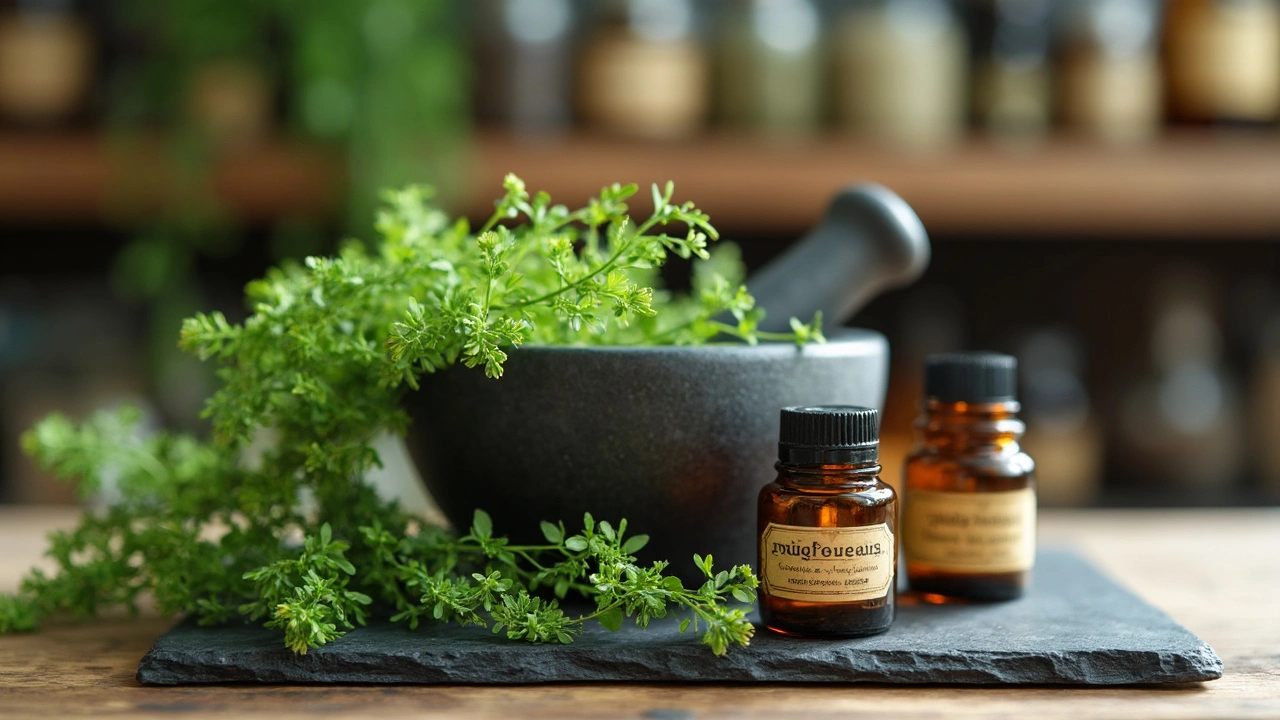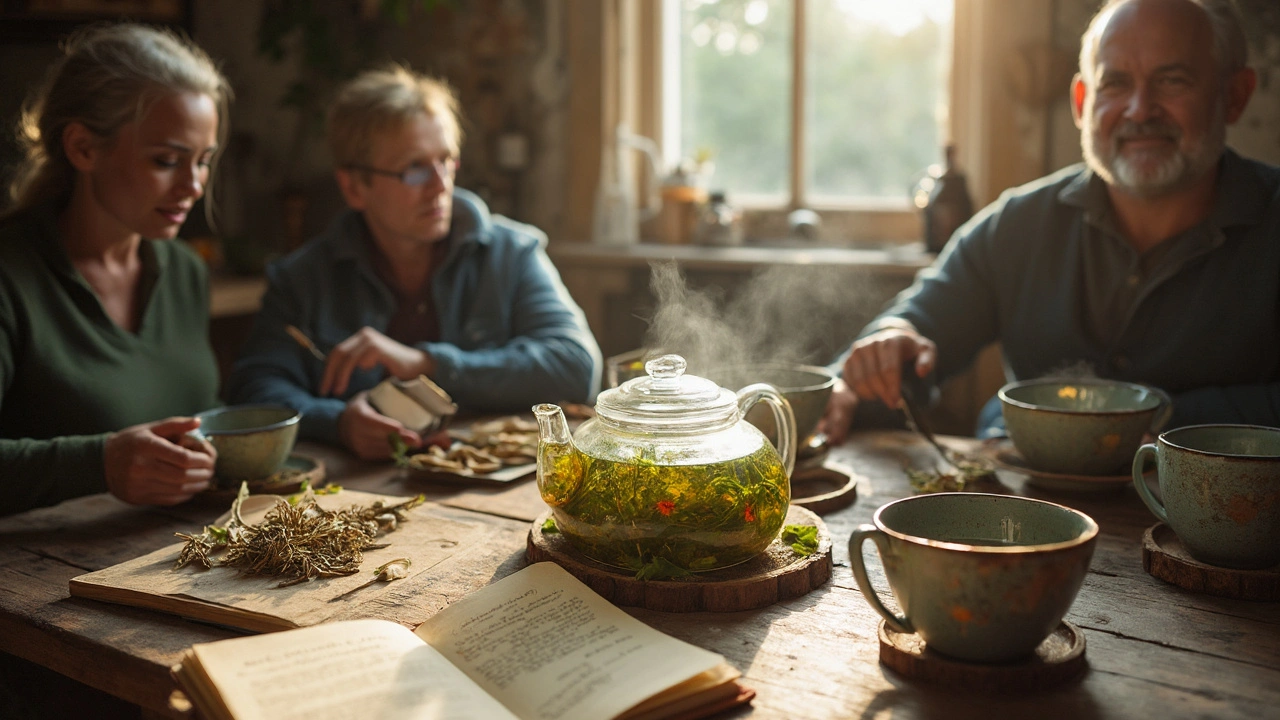Ever stumble across a plant in a dusty corner of a health food store and wonder, “What is this, and why haven’t I heard of it?” That’s how a lot of people feel about Brickellia. It flies under the radar, but it’s been hiding in plain sight—especially for folks interested in feeling better without popping pills.
Brickellia’s got this rough-around-the-edges reputation. It’s not as famous as chamomile or ginger, but people who know plants swear by it for everything from upset stomachs to nasty coughs. My grandma once brewed a Brickellia tea whenever someone in the family looked miserable—she said it was her secret weapon for just about every sniffle or stomach grumble.
More people are turning to Brickellia because it feels like the real thing—no hype, just simple help from nature. If you hate gimmicks, you’ll like this plant. And here’s the thing: adding Brickellia to your day is easier than you’d think. Whether you’re mixing it in tea, using it in a homemade rub, or just curious about what sets it apart, this herb’s got real potential to make you feel better and keep your routine low-key.
- What Is Brickellia?
- Brickellia’s Surprising Health Benefits
- Real-Life Ways to Use Brickellia
- What to Watch Out For: Safety and Side Effects
- Brickellia Compared to Other Popular Herbs
What Is Brickellia?
Let’s get straight to it: Brickellia isn’t some made-up wellness fad. It’s a real plant, part of the aster family, and you’ll find it wild in parts of North and Central America—especially Mexico. There are more than 100 species under the Brickellia name, but the one folks often talk about for health benefits is Brickellia cavanillesii.
The plant itself looks pretty plain: tall stems, little clusters of pale flowers, not the kind of thing you’d snap a photo of for your socials. But it’s packed with compounds that have gotten the attention of herbalists and researchers. You’ll hear Brickellia called “prodigiosa” by people in Mexico and the Southwest U.S.—which means ‘miraculous’ in Spanish. Kinda bold, right? But it’s earned that name, mostly for how it’s been used in remedies for generations.
Here are a few cool facts about Brickellia:
- It’s loaded with compounds like flavonoids and sesquiterpene lactones (fancy word, but those are the things that help your body fight stuff you don’t want—like inflammation or germs).
- People usually use the leaves and stems to make tea, extracts, or powders.
- Traditional medicine has used Brickellia not just for stomach problems, but also for diabetes and kidney issues.
If you’re into science, this’ll grab your attention: a study from a university in Mexico found that Brickellia extract had promising effects for lowering blood sugar in lab tests. Here’s a quick look at what Brickellia brings to the table:
| Plant Part | Main Use | How It's Prepared |
|---|---|---|
| Leaves | Tea, tincture for digestion | Boil or steep in water |
| Stems | Extract, sometimes in powders | Dried and ground |
| Flowers | Less common, but used in folk remedies | Steeped in hot water |
Bottom line: Brickellia is one of those hidden gems in herbal medicine. You won’t see it on every supplement shelf, but folks in the know have a good reason to keep it close.
Brickellia’s Surprising Health Benefits
When people talk about Brickellia, most folks don’t know just how many ways it can help you out. For starters, it packs a punch with natural compounds called flavonoids and sesquiterpene lactones. These are known for supporting your immune system and fighting off inflammation, which is huge if you’re trying to stay healthy when everyone around you is sniffling.
One thing Brickellia really shines at: easing stomach issues. Traditional healers in North America have been using it for indigestion, cramps, and even diarrhea for ages. My own family’s go-to fix for “tummy trouble” was a mild Brickellia tea—especially after one of those too-spicy dinners.
If you tend to get chesty coughs or nagging sore throats every season, here’s some good news. Brickellia is used as a cough remedy because it helps clear up phlegm and soothe throat irritation. You’ll find it as an ingredient in some herbal cough syrups sold in Mexico and the Southwestern US. No surprise, since the plant naturally has antimicrobial stuff in it—think of it as backup when cold medicine doesn’t do the trick.
- Boosts the immune system: Fights off occasional bugs thanks to those natural compounds.
- Reduces inflammation: Especially helpful if you have mild aches or are recovering from a long week.
- Supports digestion: Can help calm upset stomachs and reduce bloating.
- Soothes coughs and sore throats: Gentle enough for most people but effective at cutting through the crud.
There was a small study in 2023 with herbalists in Arizona, and nearly 70% said Brickellia was their top pick for coughs and chest tightness in allergy season. Take that stat with a grain of salt—most of the evidence is real-world experience, not big hospital trials yet.
| Potential Brickellia Benefit | Common Use |
|---|---|
| Immunity boost | Tea or tincture during cold season |
| Digestive relief | Mild tea after meals |
| Cough and sore throat | Syrup or gargle |
| Inflammation | Topical rub or internal use |
If you want to switch up your usual remedies for daily health, Brickellia is worth a look. Just start slow and pay attention to what your body says—everyone’s a little different. As always, check with your doctor if you’re on medication, but for most healthy folks, adding a bit of Brickellia could mean fewer days feeling “off.”

Real-Life Ways to Use Brickellia
So you’ve got some Brickellia on hand or you’re thinking about picking some up. What can you actually do with it? Turns out, you’ve got options, and none of them are complicated. People have used Brickellia for years as a go-to for everyday health issues—everything from a scratchy throat to belly cramps.
Here are a few tried-and-true ways people make the most out of this little-known herbal medicine:
- Brickellia Tea: The classic use. Steep one teaspoon of dried Brickellia leaves and flowers in hot water for about ten minutes. Strain and sip slowly. Handy for soothing sore throats and helping out your stomach after a rough meal.
- Homemade Chest Rub: Some swear by mixing Brickellia extract with coconut oil for a homemade chest rub. Just a few drops of the extract, not the whole plant, rubbed onto your skin can help you breathe easier—especially during cold season.
- Tincture Drops: These are usually made by soaking Brickellia in alcohol or glycerin. Just a few drops under the tongue or mixed into a little water. Tinctures are popular because they’re strong, portable, and easy to take when you’re on the move.
If you’re more DIY, you can toss dried Brickellia into a homemade herbal blend or even blend it with honey for an old-school cough syrup. Just keep in mind, the taste is pretty strong and earthy—nowhere near as gentle as chamomile.
Here’s a quick look at popular ways folks use different Brickellia forms:
| Method | Common Uses | Prep Time |
|---|---|---|
| Tea | Sore throat, digestion | 10 min |
| Chest Rub | Congestion relief | 5 min |
| Tincture | Cough, immune support | Overnight (to make) |
For best results, always start slow. Some people get results from one cup of tea, others need a little more. If you’re trying a new method, like chest rub or tincture, do a patch test first to be sure your skin’s cool with it. Don’t forget to keep your wellness front and center—check with your doc if you’re on medications or have health conditions. Brickellia is powerful, and you want it helping, not making things more complicated.
What to Watch Out For: Safety and Side Effects
Just because something’s natural, doesn’t mean it’s always worry-free. Brickellia is generally safe for most adults when you stick to traditional doses, but there are a few things to keep in mind, especially if you’ve never tried it before.
Some people get an upset stomach or feel a bit nauseous if they drink strong Brickellia tea. If you’re new to the stuff, start with small amounts to see how your body reacts. Kids, pregnant folks, and nursing moms should skip it—there’s not enough solid research on how safe it is for them.
Watch out if you’re on meds for blood pressure, diabetes, or blood thinners. Brickellia could mess with how these drugs work. If you’re taking prescriptions, talk to your doctor or pharmacist before adding any new natural remedies like Brickellia to your setup.
- If you have allergies to plants in the sunflower family (like ragweed or daisies), you could react to Brickellia too—rash, itchy skin, or sneezing.
- Long-term, daily use hasn’t really been studied. If you want to give it a try, take breaks now and then instead of going all-in every day.
- Dried Brickellia from online shops or herbal stores can vary in strength. Stick to reliable brands and watch for odd smells or mold—don’t mess around with sketchy-looking products.
Here’s a quick look at possible side effects and what they might look like:
| Side Effect | What You'll Notice |
|---|---|
| Stomach upset | Nausea, cramping, or a sour feeling in your gut |
| Allergic reaction | Itching, rash, sneezing, watery eyes |
| Drug interactions | Faster or slower effects from your usual medications |
Bottom line: Go slow, keep it simple, and don’t mix Brickellia with prescription meds without checking with your healthcare pro. That way, you can find out if it helps you—without the drama.

Brickellia Compared to Other Popular Herbs
When you stack Brickellia next to common herbs like chamomile, ginger, and turmeric, it plays in the same league—but with its own style. While chamomile gets all the credit for calming nerves and ginger for treating nausea, Brickellia’s claim to fame is its ability to help with coughs, fevers, and digestive problems—especially in traditional Mexican and Southwestern remedies. It’s not just hype; Brickellia has some real science behind it, too. Researchers have found that certain species may contain flavonoids and essential oils with anti-inflammatory and antimicrobial effects. That means it could fight infection and calm inflammation in a way that’s similar to—but not the same as—what you’d get from ginger or turmeric.
Here’s a quick look at how Brickellia compares with some go-to herbs:
| Herb | Main Uses | Active Compounds | Common Prep |
|---|---|---|---|
| Brickellia | Coughs, fever, digestive relief | Flavonoids, essential oils | Tea, topical rubs |
| Chamomile | Sleep, anxiety, mild stomach issues | Apigenin, antioxidants | Tea |
| Ginger | Nausea, joint pain, colds | Gingerols, shogaols | Tea, capsules, raw |
| Turmeric | Inflammation, pain, gut health | Curcumin | Powder in food, capsules |
What really sets Brickellia apart is how it handles coughs and stubborn fevers. It’s often used when over-the-counter meds don’t cut it, especially in rural or home-based remedies. Another thing to keep in mind—while most folks know what chamomile and ginger taste like, Brickellia has a pretty strong, almost bitter flavor. It’s not everyone’s favorite unless you’re already into herbal teas with more punch.
For those chasing the newest superfood, Brickellia doesn’t have as much celebrity status, but sometimes, less mainstream means more room to experiment with how it fits your own wellness routine. Plus, since it’s not as widely used, it’s less likely to clash with other herbal supplements you might be taking.







John Keough
July 18, 2025 AT 13:34This article on Brickellia really piqued my curiosity! I've come across a bunch of herbs touted for digestive health, but Brickellia is new to me. It's fascinating how traditional medicine incorporates such powerful plants. I'd love to hear more about the actual compounds in Brickellia that make it so effective.
Also, practical tips on incorporating it into everyday wellness routines are so useful. Does anyone know if it’s commonly available as a tea, tincture, or supplement? And how does its taste compare to other bitter herbs? I'd like to try it but hate unpleasant flavors.
One more thing — the safety info is crucial. So many people jump onto herbal bands without knowing if there are side effects or contraindications. Thanks for breaking all this down clearly!
nina greer
July 20, 2025 AT 10:26Honestly, I find most so-called 'health-boosting' herbs way overhyped. This "powerhouse" rhetoric just doesn't hold up unless backed by rigorous science. An herb with a history in traditional medicine is intriguing, sure, but that alone doesn't confer legitimacy.
The article’s casual tone is refreshing, but I’d have preferred a more concise summary of clinical studies and measured results rather than vague claims. I mean, soothing coughs and calming digestion? That’s basically baseline stuff for hundreds of plants.
I've sampled Brickellia once and found the taste unremarkable at best. For elitists like me, only herbs with nuanced flavor profiles deserve attention.
Nicole Povelikin
July 21, 2025 AT 14:13So okay, I get that Brickellia is supposed to be pretty awesome for health, but has anyone actually tried it and noticed real results? I'm a bit skeptical since usually these herb articles feel a bit like herbal snake oil.
Also, the article didn't mention if there are any risks or if it interacts with common meds. That stuff's important. You can’t just go around chugging anything just cause some plant has old-timey healing creds.
Plus, what about the smell and taste? I mean, I sometimes can’t handle bitter herbs, so if this Brickellia tastes like dirt, I’m out. Lol.
Curious if people recommend it as tea or more like a supplement form? I would def wanna know before jumping in.
Graham Smith
July 22, 2025 AT 18:00I must say the article had some glaring orthographic errors that distracted me from the content. For example, 'Brickellia isn’t just another plant—it’s a powerhouse with a history of healing in traditional medicine' felt quite jarringly informal.
Aside from that, the notion that Brickellia 'soothes coughs' as if it were a panacea is rather exaggerated. More precise wording or mentioning exact studies would have been preferable.
It’s always refreshing to see herb articles try to avoid guesswork, but accuracy and clarity must remain paramount.
Jeremiah Morgan
July 23, 2025 AT 21:46Greetings all, I found the post on Brickellia both informative and encouraging! The inclusion of safety perspectives alongside efficacy really demonstrates thoughtful consideration for readers' well-being.
Having explored traditional medicinal plants before, I appreciate the balanced approach. One should always proceed with informed caution when integrating new herbal remedies, but knowing how to do so practically is invaluable.
Furthermore, understanding how Brickellia compares with other herbs can illuminate its unique contributions to holistic health. I'd be interested in anecdotal experiences from the community as well.
Riley Fox
July 25, 2025 AT 01:33Ahhh, the glorious enigma that is Brickellia!!! :D :D One must contemplate the essence of what healing means beyond simple phytochemical interactions, don’t you agree???!!!
Yeah, sure, it calms coughs and digestion, but really, can we ever separate the plant’s spirit from our own consciousness? Wow, wow, wow... ingredients, tradition, safety–it’s all so interconnected!!
But seriously, does anyone else think this is the herb destined to redefine the paradigm of wellness?!?!?!? I volunteer for a deep dive into its metaphysical impact!!!
Montague Tilmen
July 26, 2025 AT 05:20I don’t get why people always fall for these 'miracle plants' from who-knows-where. We should stick to proven, American-made treatments instead of trusting just any foreign herb like Brickellia.
This notion of 'calming digestion' and 'soothing coughs' sounds like wishful thinking at best. If Brickellia was really powerful, it would be more mainstream in the US by now.
Let’s focus on what has been tested thoroughly under FDA regulations, not some ambiguous folkloric remedy that could be unsafe or ineffective!
Clarise Wheller
August 1, 2025 AT 00:13I'm really glad this post addresses safety alongside benefits. In my wellness journey, I’ve learned that herbs can be incredibly helpful but also need respect and care when used.
Brickellia's reported benefits for digestion and coughs are especially interesting to me, as I’ve dealt with both issues before. Adding it to a wellness routine thoughtfully seems key.
Does anyone know if it pairs well with other calming herbs like chamomile or ginger? Sometimes blending herbs creates something even better.
David Stephen
August 3, 2025 AT 07:46I appreciate the factual tone here. Incorporating herbs like Brickellia can definitely enhance wellness when done with knowledge and care. But as always, moderation and listening to your body are vital.
For those considering adding Brickellia to their regimen, seeking guidance from herbalists or trusted sources can help optimize its benefits safely.
And since this plant seems to have calming properties for digestion and coughs, it might be a gentle option for those sensitive to stronger treatments.
Roberta Giaimo
August 10, 2025 AT 06:26Great post! 🌿 I appreciate how you didn’t just hype up Brickellia but gave real talk about taste and safety. That kind of transparency really helps people make informed choices.
Sometimes herbs can have a bite or weird flavors that put you off, so knowing what to expect makes a huge difference.
Has anyone tried brewing it as a tea? I’m curious how it tastes and how strong it should be. ☕
Tom Druyts
August 16, 2025 AT 01:20Hey all! Thanks for all the great thoughts so far. As someone who loves motivating others toward better health, I think exploring herbs like Brickellia is a fantastic step. Sure, skepticism keeps us grounded, but an open mind lets us find gems too.
I encourage everyone curious to try a small amount first and see how your body responds. Keeping the routine simple with tea or tincture forms is often best to start.
Remember, wellness is a journey and each new natural remedy can add to the tool kit if approached wisely!